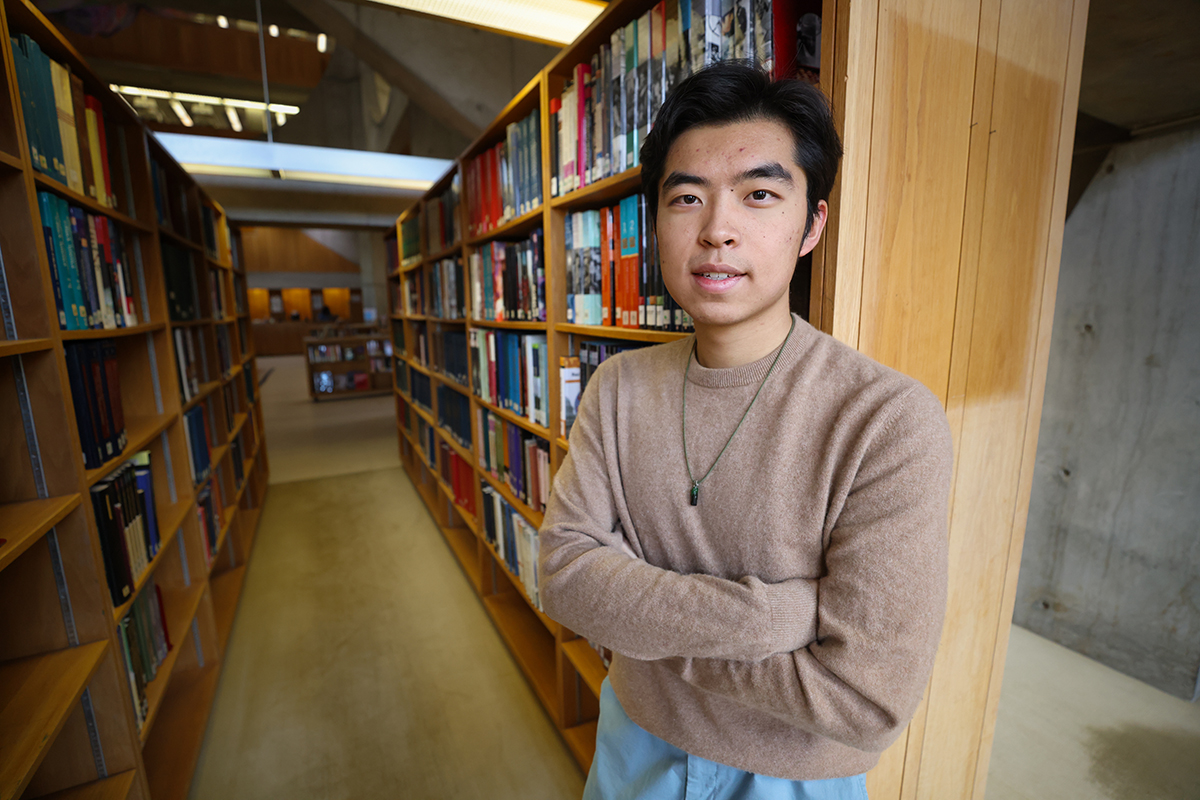Andrew Yuan

In the basement of the Class of 1945 Library, amid boxes and folders stocked with brittle pages tinted brown with age, Andrew Yuan ’24 is excavating a part of Exeter’s history too long left in the shadows.
For his senior project, “The Legacy of Slavery at Exeter,” Yuan mined the school’s archives, the records of the Exeter Historical Society and a wealth of other digital and analog resources to create a multilayered investigation of the relationship between the Academy and the institution of slavery over a period of more than 100 years.
“It’s a part of history that has not been recognized as it should have been,” Yuan says. “There was a need to really get down in the archives to know what went down during the years of Exeter’s founding as an institution, how slavery shaped it and how we as a community are reconciling [ourselves] with that fact.”
In choosing the focus of his research, Yuan was inspired by colleges and universities around the country who have reexamined the legacy of slavery at their institutions, including Brown and Harvard. His completed project explores the historical context of how slavery functioned in New England at the time and delves into the lives of several individuals known to have been enslaved by John Phillips and his family members. It goes on to investigate the ties between the Academy and slavery from the late 18th to early 19th centuries and consider the lasting implications of that legacy today.
“When we’re talking about accepting youth from every quarter, we use that as a praise for the diversity that we have on campus right now,” Yuan says. “But it should also be acknowledgement of the fact that the first few international students we accepted were [the children of] West Indies plantation owners.”
At Exeter, Yuan has taken high-level courses in both STEM and humanities, but has made history his main focus. He credits the three-course U.S. history sequence with piquing his interest in the subject, as well as instructors like Betty Luther-Hillman and Aykut Kilinc, with whom he has studied both U.S. history and the contemporary Middle East. “The history curriculum at Exeter has propelled me to look at history in a more nuanced way, and in a more civic way,” Yuan says.
During his upper year, Yuan and other students successfully petitioned History Department Chair Kent McConnell to restart a senior-level seminar, HIS 999, focused on doing independent research using mainly the Academy Archives. The course had been suspended when access to the archives was limited during the COVID-19 pandemic.
Inspired to dive into the study of Exeter’s legacy of slavery, Yuan read about a fellow alum, Carissa Chen ’17, who researched descendants of the enslaved people connected with Harvard while an undergraduate there. He reached out to Chen and ended up consulting her multiple times during his own research.

For his senior project, Yuan expanded on his HIS 999 paper, and focused more on the 1830s through the 1860s, an era of intense national divisions over the slavery question that eventually culminated in the Civil War. “Contrary to what I had originally believed…[during this period] Exeter expanded on its admission of families from the South, who came from plantations, who owned multiple slaves,” he says. “Many Exonians joined the Confederacy as soldiers voluntarily…and many of these students were raised in the North, in families who were very anti-slavery and pro-Union.”
Yuan presented his project last fall to fellow students, faculty and staff, and he is also a member of the Committee to Study Slavery and its Legacy at Exeter. Made up of three branches — staff and faculty, alumni and students — the committee has been charged with reporting on the Academy’s history and connection with enslaved persons and making recommendations for how to appropriately recognize and raise awareness of this history in the school community.
This spring, Yuan will attend the Washington Intern Program. Having worked on congressional and gubernatorial campaigns and interned at his congressional district office in New York City, he’s excited to pursue policy change both at Exeter and on the wider stage.
When it comes to shedding light on the Academy’s relationship with slavery, however, he draws a clear line. “I’m not stepping into the role of an activist while I’m doing this historical research,” he says. “I’m just trying to restore history.”
— Sarah Pruitt ’95